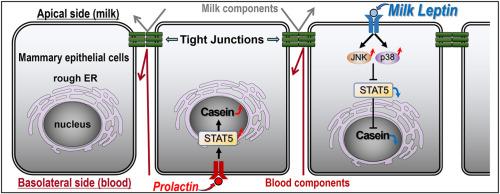顶端表面的瘦素可抑制乳腺上皮细胞中酪蛋白的产生和 STAT5 的磷酸化。
IF 3.3
3区 生物学
Q3 CELL BIOLOGY
引用次数: 0
摘要
瘦素是一种存在于血液和乳汁中的肽类激素。以前曾有报道称,瘦素与哺乳期乳腺的产奶量关系密切。然而,瘦素如何影响哺乳期乳腺的产奶量仍不清楚。此外,乳汁或血液中的瘦素是否会影响哺乳期的乳腺上皮细胞(MECs)也有待进一步研究。本研究利用一种培养模型研究了瘦素对小鼠乳腺上皮细胞的影响,在该模型中,乳腺上皮细胞产生乳汁成分并形成通透性较低的紧密连接。我们的研究结果表明,瘦素以浓度依赖的方式抑制了MEC中β-酪蛋白的产生。瘦素还会使信号转导和转录激活因子5(STAT5)失活,而STAT5是一种转录因子,能促进MEC产奶。在STAT5失活之前,瘦素处理会诱导MEC中p38和c-Jun N-末端激酶(JNK)的活化,而p38和JNK的活化剂异霉素会诱导STAT5失活。此外,MECs顶端表面的瘦素暴露抑制了β-酪蛋白的产生,并使STAT5失活。然而,瘦素暴露于基底侧表面几乎不会产生这些影响。这些发现表明,牛奶中的瘦素而非血浆中的瘦素抑制了MECs的乳汁分泌。本文章由计算机程序翻译,如有差异,请以英文原文为准。

Leptin on the apical surface inhibits casein production and STAT5 phosphorylation in mammary epithelial cells
Leptin is a peptide hormone present in both the blood and milk. A close relationship between leptin and milk production in lactating mammary glands has been previously reported. However, how leptin influences milk production in lactating mammary glands remains unclear. Also, whether leptin in milk or blood influences mammary epithelial cells (MECs) during lactation needs further investigation. This study investigated the effects of leptin on mouse MECs using a culture model in which MECs produced milk components and formed less permeable tight junctions. Our results showed that β-casein production in MEC was inhibited by leptin in a concentration-dependent manner. Leptin also inactivated the signal transducer and activator of transcription 5 (STAT5), a transcription factor that facilitates milk production in MECs. Leptin treatment induced the activation of p38 and c-Jun N-terminal kinase (JNK) in MEC before STAT5 inactivation, and anisomycin, an activator of p38 and JNK, induced the inactivation of STAT5. Furthermore, leptin exposure on the apical surface of MECs inhibited β-casein production and inactivated STAT5. However, leptin exposure on the basolateral surface hardly caused these effects. These findings suggested that milk leptin, but not plasma leptin, inhibited milk production in MECs.
求助全文
通过发布文献求助,成功后即可免费获取论文全文。
去求助
来源期刊

Experimental cell research
医学-细胞生物学
CiteScore
7.20
自引率
0.00%
发文量
295
审稿时长
30 days
期刊介绍:
Our scope includes but is not limited to areas such as: Chromosome biology; Chromatin and epigenetics; DNA repair; Gene regulation; Nuclear import-export; RNA processing; Non-coding RNAs; Organelle biology; The cytoskeleton; Intracellular trafficking; Cell-cell and cell-matrix interactions; Cell motility and migration; Cell proliferation; Cellular differentiation; Signal transduction; Programmed cell death.
 求助内容:
求助内容: 应助结果提醒方式:
应助结果提醒方式:


